Confessions of an Academic Pseudo-Giraffe
from the NY times...
Finland Squirms as Its Latest Export Steps Into Spotlight
HELSINKI, Finland They have eight-foot retractable latex Satan wings, sing
hits like "Chainsaw Buffet" and blow up slabs of smoking meat on stage. So
members of the band Lordi expected a reaction when they beat a crooner of
love ballads to represent Finland at the Eurovision song contest in Athens,
the competition that was the springboard for Abba and Celine Dion.
But the heavy-metal monster band did not imagine a national identity crisis.
First, Finnish religious leaders warned that the Freddy Krueger look-alikes
could inspire Satanic worship. Then critics called for President Tarja
Halonen to use her constitutional powers to veto the band and nominate a
traditional Finnish folk singer instead. Rumors even circulated that Lordi
members were agents sent by President Vladimir V. Putin to destabilize
Finland before a Russian coup an explanation for their refusal to take off
their freakish masks in public.
The fury also spread in Greece, winner of last year's Eurovision and
therefore the host of this year's contest, where an anti-Lordi movement
called Hellenes urged the Finnish government "to say 'no' to this evil
group." One young Finn calling himself Suomi (Finland in Finnish) wrote to a
newspaper Web log saying, "If Lordi wins Eurovision, I am leaving the
country."
The lead singer, Lordi a former film student who goes by his real name,
Tomi Putaansuu, when not wielding a blood-spurting electric chain saw is
philosophical about the uproar.
The affair, Mr. Putaansuu says, has exposed the insecurity of a young
country whose peculiar language is spoken by only six million people
worldwide and whose sense of identity has been dented by being part of the
Swedish kingdom and the Russian empire until gaining independence in 1917.
Most Finns, he adds, would rather be known for Santa Claus than heavily
made-up monster mutants.
"In Finland, we have no Eiffel Tower, few real famous artists, it is
freezing cold and we suffer from low self-esteem," said Mr. Putaansuu, who,
as Lordi, has horns protruding from his forehead and sports long black
fingernails.
As he stuck out his tongue menacingly, his red demon eyes glaring, Lordi was
surrounded by Kita, an alien-man-beast predator who plays flame-spitting
drums inside a cage; Awa, a blood-splattered ghost who howls backup vocals;
Ox, a zombie bull who plays bass; and Amen, a mummy in a rubber loincloth
who plays guitar.
Dragging on a cigarette, Mr. Putaansuu added, "Finns nearly choked on their
cereal when they realized we were the face Finland would be showing to the
world."
Often derided as a showcase of kitsch, Eurovision is one of the most watched
television programs in the world. It pits pop groups from all over Europe
and the Middle East against one another, with the winner decided by popular
vote by more than 600 million viewers.
It is not the first time the contest, which began in 1956, has spawned
discontent. Last year's Ukrainian entry song was rewritten after being
deemed too political by government officials in Kiev because it celebrated
the Orange Revolution. When Dana International, an Israeli transsexual, won
in 1998 with her hit song "Diva," rabbis accused her of flouting the values
of the Jewish state.
But not everyone in this Nordic country of five million views the monster
squad as un-Finnish. Some Finns say that Lordi is right at home and that the
band's use of flaming dragon-encrusted swords and exploding baby dolls
expresses the warrior spirit of the Vikings.
Alex Nieminen, a Finnish ad executive, says the band harks back to the
Hakkapeliittas, the legendary Finnish cavalry unit that fought as part of
the Swedish army in the 17th century. He argues that the slasher film
imitators embody Finnish self-assertion after decades of isolation.
"Lordi represents a rebellion by Finns who are saying, 'Hey we are not all
the Nokia-wielding people the government would like you to think we are,' "
Mr. Nieminen said.
On the eve of the vote, fans in ghoulish monster outfits held Lordi parties
from Helsinki to Lapland and sent text messages urging everyone from
grandmothers to young metal heads to "Change the face of Finland!" Lordi won
the right to go to Athens with its Kiss-inspired anthem "Hard Rock
Hallelujah" and its lyrics, "Wings on my back/I got horns on my head/my
fangs are sharp/and my eyes are red."
The Finns' fascination for Lordi may reflect their eternal hope after coming
in last at Eurovision eight times. Some Finns rank that humiliation with
their nation's appeasement of the Soviet Union or losing in hockey to
Sweden.
Finns blame their losing streak on the fact that contestants have typically
sung in their mother tongue, a famously difficult Uralic language where
words with three umlauts are not uncommon.
" 'Finland, zero points' has become a source of deep embarrassment in the
nation's psyche," Ilkka Mattila, the country's leading music critic, said.
"So Lordi's success must be understood as a vote by people who feel we have
nothing to lose."
Finns are so uncomfortable with themselves, says Alexander Stubb, a Finnish
member of the European Parliament, that when they meet someone for the first
time, they stare at their own feet. Then, after 10 years of friendship, they
stare at the other person's feet. But there is little risk that anyone,
Finnish or otherwise, will stare at Lordi's furry platform demon boots, he
adds, noting that Lordi could embarrass Finland when it takes over the
European Union presidency in July.
Timo Soini, leader of "Ordinary Finns," a traditionalist political party
from rural Finland, says Lordi has attracted criticism because Finns are so
thin-skinned about how others perceive them. "Finns are suspicious when they
see someone new come to play in their sandbox," Mr. Soini said. "And that is
particularly the case when that someone looks like a monster."
While other boys in Lapland were playing hockey, Mr. Putaansuu played with
his Barbie doll and began experimenting with makeup. In film school he
became obsessed with horror films and the heavy metal bands Kiss and Twisted
Sister. Like his fellow metal heads, Mr. Putaansuu hoped that transgression
would sell big. But he says it took 10 years to get a record deal because
Finnish labels were so turned off by the band's appearance.
Under their masks, the band members are quintessential Finns. Awa, the
ghost, is a soft-spoken blond who wears glasses and studied classical music.
Even Mr. Putaansuu, who wears a black leather jacket when not sporting
serpent lapels, says his music is closer to gospel than Satan. After all,
one of the band's hit songs is "The Devil Is a Loser."
"Even if we lose the contest, we have already won," Mr. Putaansuu said.
"Many Finns would rather have sent someone boring and acceptable than to be
represented by freaks like us."
Climbing a mountain at Easter sounds quite a biblical quest. We just spent about four days wandering about Mount Elgon National Park in eastern Uganda, on the Kenyan border. Sunday was peak day, devoted to Wagagai Summit (4,321 m above sea level). Elgon is an extinct volcano with a large caldera at the top and several peaks reaching almost to the same height around it. Four thousand metres is already an altitude that changes the way human bodies operate; especially upwards one tends to (and should) go much slower than the mind would like to. Walking like zombies, in other words, is the principle. Oxygen is not quite as readily available as at sea level (eller hur, Kirsi?). A few days in those heights, especially when combined with tens of kilometres of walking, can easily cause some headaches.
Hiking in the Nordic countries, everyone carries their own stuff to and fro, including tents and food. Not here. Between us three mzungus, we had three porters (plus two guides with guns), with only a few kilos on our own backs. It certainly made progress a lot easier and faster, and the guys were nice, though at the same time it feels odd to have to socialise with a bunch of strangers during a hiking trip (which, to me, is by definition a retreat to nature and silence). And then, of course, there is the usual and quite absurd hassle of tips. I’ve never understood or liked the culture of tipping, but it gets even more bothersome when it’s a completely unofficial (yet somehow compulsory) practice separated from the main payments. Park entrance fees include the guides, and we paid the porters in advance, but still everyone expected more cash afterwards. Since Uganda in general is not a tipping society in an established way – drivers of metered taxis don’t expect any extra, in restaurants it’s just a few per cent if any – it is next to impossible to figure out what people like these workers expect. The only reason they expect tips in the first place is that they work in a field that serves tourists; wealthy visitors from established tipping societies have created the demand. Whenever I see this "I’ve been paid but I want more" look on someone’s face I get the same disturbing feeling as with street beggars. Somehow it’s almost impossible to do the right thing because added supply will only result in increased demand (which will cause more awkward situations).
Nature in Mount Elgon was wonderful, except that we saw almost no animals. It was all scenery and flora. The area above 3,500 m is full of giant lobelias, some five metres tall. It’s strange to walk in a forest of flowers. We did see two kinds of colobus monkeys and some birds, and a buffalo path, but a lot of the pictures taken during the hike are portraits of lobelias in bloom, growing alone or in groups of hundreds.
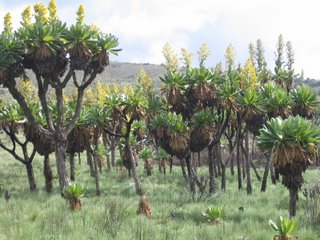
The first evening after starting on the Piswa trail from the village of Kapkwata was bad. We had two hours of solid rain and arrived in the camp after dark, all wet, cold, hungry, and tired. Warming up took a lot of effort, and the smoke from the fire always seemed to head straight for my eyes. The improvised pasta dinner had to be forced down. And of course the tent, rented from the UWA, was way too small for my height. Four nights of curling on my side on bumpy ground didn’t seem a nice prospect.
The national park is not always in harmony with local communities. The growing population needs more land for agriculture, and most of the people don't see the point of protecting nature. There are some poachers and a lot of encroachers. People simply use the protected area as if it were their own land, and politicians do little because the encroachers are also voters. In Elgon, the problem is more visible than in most Ugandan parks because the Mbale area is relatively densely populated. At least two patrol huts used by the UWA were burned a couple of months ago. Here are the remains of one.
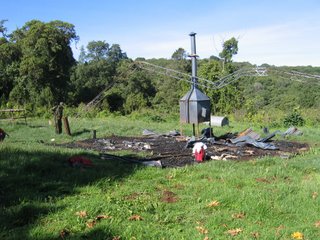
Day two was warm, 22 km and an estimated 1,100 m climb to Hunter's Cave (3780 m asl). We moved from the rainforest zone to a bushy area and further above the treeline to what I can only call lobelia country. Lunch at a sunny brook. After a sweaty day, it was nice to clean up in another little stream by the camp. This whole day, as well as the next one, we were lucky to have no rain whatsoever. April and May are usually the wettest months, and most afternoons there is at least a one-hour shower.
Daylight stipulated the timetable: it's necessary to start early. After dark (7 p.m.) there's not much else to do but sleep.A downpour before Hunter's Cave would have been nasty because the next night was very cold. When I opened the door zipper at six in the morning, a thin sheet of ice covered the whole tent and the grass outside. At dawn, the view to the valley was nothing to complain about (the pic is from the previous evening).
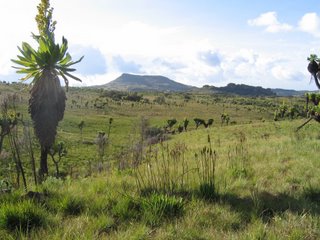
The day started with a steep uphill that lead to the rim of the caldera above 4,000 metres. The top offers an excellent panorama of mountain silhouettes, the easternmost of which are on the Kenyan side. Suam Gorge draws the border on the ground. There are some hot springs in the caldera, but they are not accessible in the rainy season.
We crossed the caldera towards the west, joining the busier Ssasa trail on our way towards the western canyon. Then followed the first descent of the trip. Mude Cave, the next camp, is located at about 3,500 m in a bush of short evergreen trees. The larger number of visitors on the Ssasa trail was immediately evident: in the camp we met other hikers for the first time, and the place even had a pit latrine (what's commonly called a "long drop")! The latter is a big deal – a big change from digging your own holes – since life on the hike is often centred on food and its digestion.
The next day we headed back for the first few kilometres and then turned towards the peaks. It was 9 km one way, an 800-metre climb. Although Wagagai is the highest summit, there are a couple others that look more dramatic. One of them is called Jackson's Summit (4160), which we had a good look at on the way up. The other picture is from Wagagai; the next peak, whose name I forgot, was a lookalike of JS.
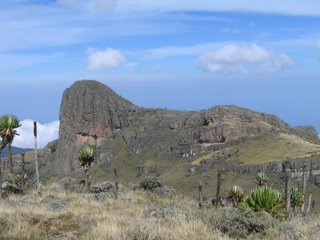
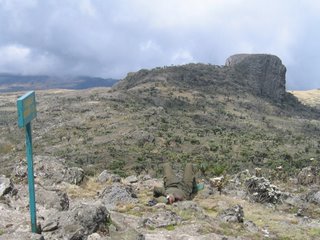
One of our porters walked the whole trip barefoot! Apparently his boots had just been damaged beyond repair, but we only heard about it after wondering amongst ourselves for days whether the guy, who barely (pun intended) spoke a word in the whole time, simply preferred to wear no shoes. I can only imagine how he felt sleeping at Hunter's Cave, where the guys didn't even have a hut, and the temperature dropped below zero. Every porter was very fit physically: they could have easily gone a lot faster than we did even though they had the heaviest loads. We didn't have a proper backpack for everyone, which is why we bought a big Winnie the Pooh bag on the way to Kapkwata. One of the guys carried it on top of his head for sixty kilometres. Poor Winnie didn't make it to the summit because the heavy baggage stayed down that day. The barefoot guy, however, came to the top as a tourist – he had never been there before.
The last day was the nastiest physically. It was one long downhill of over two thousand vertical metres. The path was not particularly wet but still enormously slippery. It was only possible to step in its middle part in a totally flat spot. I started to suspect this had something to do with the materials of our soles because the guides in their rubber boots kept stepping in the middle with no slips whatsoever. They, of course, said they were simply used to the conditions, but I had trouble believing that experience defies gravity in such an uncanny way. This picture is from the top of the steepest part, a practically straight-down drop of several hundred metres at the forest's edge. Had it rained, it could have been seriously dangerous to come down that slope. Now we managed, one sideways step at the time.
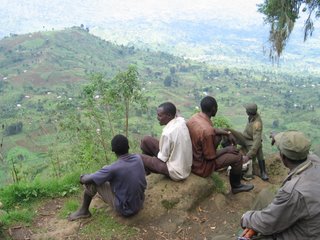
The afternoon ended with the three muddy mzungus and an enormous amount of muddy stuff travelling to Mbale in a matatu. The ride had all the classic elements: over twenty people, sacks of charcoal, a bunch of matooke, and at least one live chicken manoeuvred into a Toyota Hiace, which crept forward on a choppy dirt road with plenty of bouncing and rattling.

